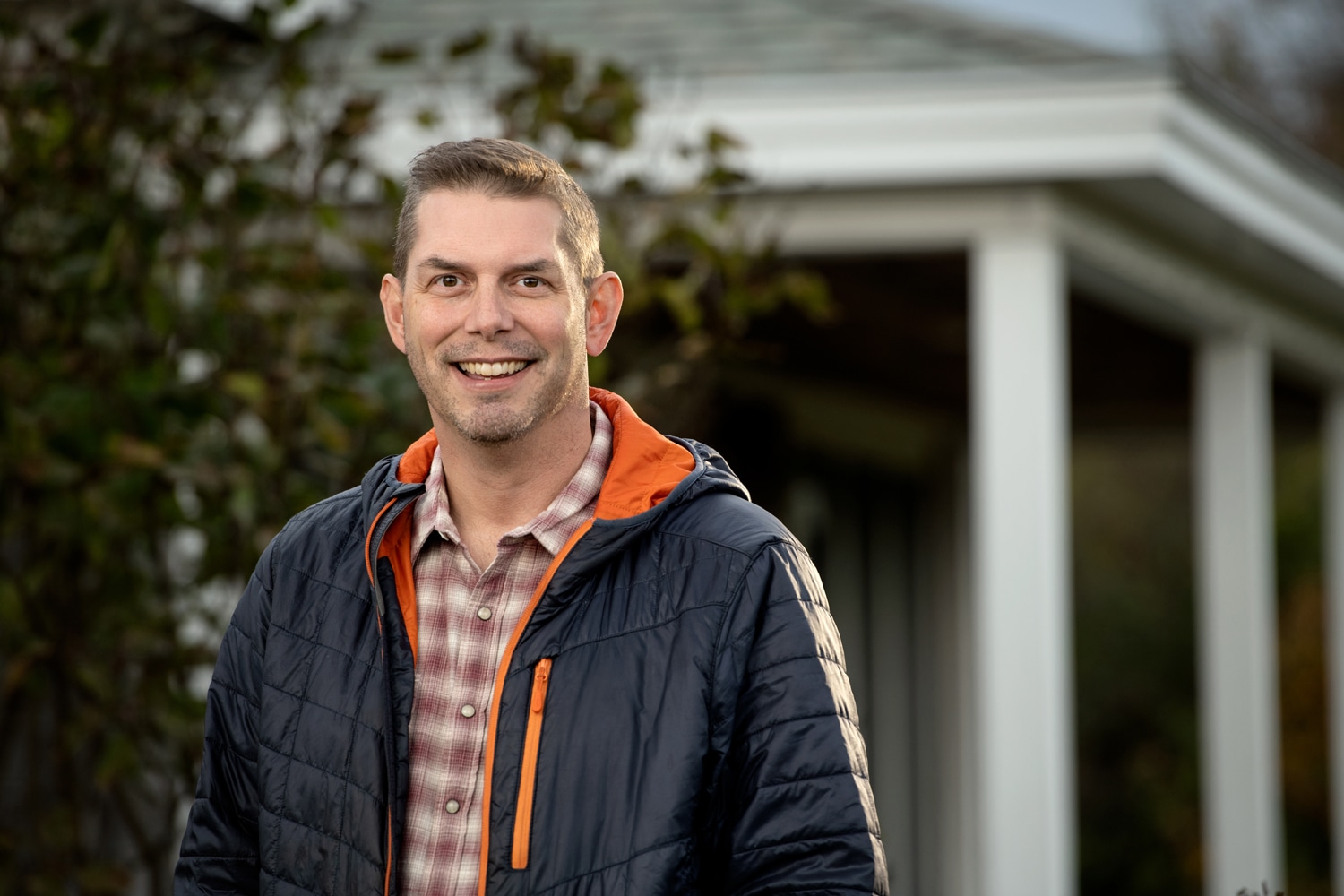THE WORDS WERE GENTLE and spoken with love, but they hit Trevor Maxwell like a punch to the gut.
“Things have to change around here. We need more joy in our lives,” said his then-11-year-old daughter, Elsie. “I know it’s hard, but it’s too sad.”
“Sad” was not a label many would have applied to the 42-year-old husband and father of two children before that day in December 2018. A former newspaper journalist turned freelancer and a physically active outdoors type, Maxwell enjoyed hikes and skiing trips with his family. But in March 2018, he was blindsided by a stage III colon cancer diagnosis. The diagnosis and the rigors of cancer treatment sent him into a deep depression. He found himself planted on the couch of his family’s home in Cape Elizabeth, Maine, wishing he could run into the woods and hide.
“I felt like I was a burden on my family and others, and if I just disappeared it would be for the best for everyone,” Maxwell says.
There is nothing heroic or romantic about being a lone wolf, however, not when there is strength and comfort in a pack. Elsie’s comment was a wake-up call that brought Maxwell back to the present, to himself and to his family. “Here’s my child, leading me,” he says. “Sometimes that’s what it takes.”
When his wife, Sarah, asked how she could help, he responded, “I am so sad about the idea that I will not be around to raise our girls. I am afraid they will remember me as being sick.”
“She told me, ‘I’m not afraid they will remember you as sick. I’m afraid they will remember you as sad, because you’re not a sad person,’” Maxwell recalls. “She’s like, ‘No matter if you have a year left, or you have 40 years left, we need to try to somehow get you back to the point where you are engaged in life, and you are living with joy and purpose.’”
That was the turning point for Maxwell. He sought counseling at the Dempsey Center in nearby South Portland, Maine. The center was founded by actor Patrick Dempsey to provide support services for people facing cancer. Maxwell began attending cancer support groups in person and online to connect with other men dealing with colon cancer treatment and its aftermath.
Making those connections changed his quality of life for the better, and Maxwell realized he wanted to help other men struggling with their mental health during cancer treatment. He’d seen firsthand how many men buckled under the weight of their diagnosis, and he wanted to help. So in early 2020, he formed Man Up to Cancer, a company offering online information, resources, community and an emotional support network for men dealing with cancer. Man Up to Cancer was designed to reframe how men could think about what it means to be a man and a cancer patient.
“The old way was for men to just suck it up, be strong and silent,” Maxwell says. “The new way we are trying to put out there is that you don’t have to go through cancer on your own. That you can have a community that has your back.”
The Unexpected Diagnosis
Toward the end of 2017, Maxwell, accustomed to an active lifestyle full of hiking and chopping wood, found himself struggling through everyday tasks. At first, he chalked it up to a busy midlife. He and Sarah were often rushing to keep up with the schedules of their 12- and 10-year-old daughters, Sage and Elsie, while Maxwell’s public relations and writing business was thriving.
On March 18, 2018, after a day spent skiing with his family, Maxwell got a call from his doctor, who had ordered blood work at his last appointment after he complained of feeling tired.
“I got a message from my primary care doctor saying, ‘Give me a call, it doesn’t matter what time it is,’” Maxwell says. “Any time you get that on a weekend from your doctor, it’s generally not the best news.”
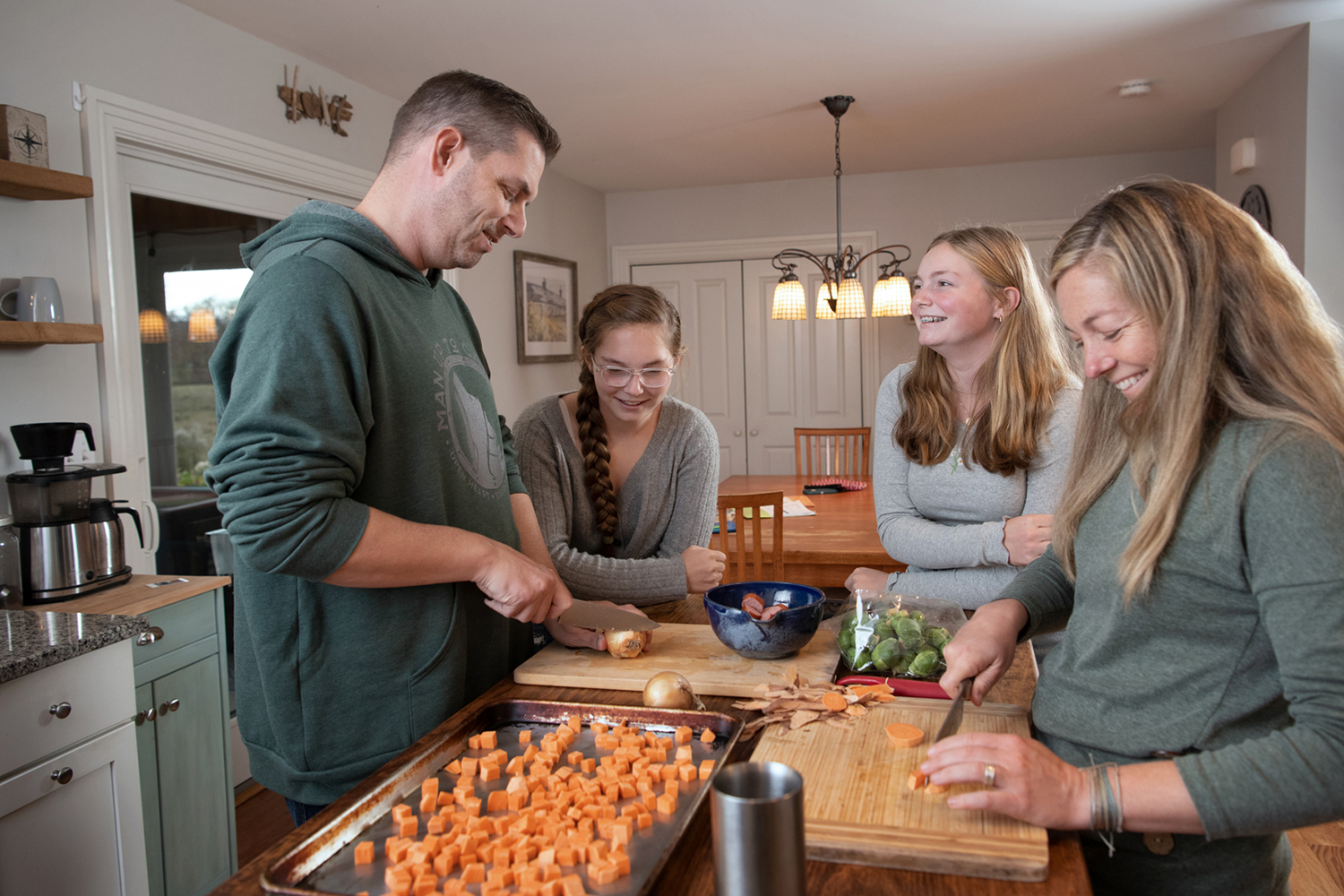
When he reached the doctor, Maxwell learned he was anemic, which for an otherwise healthy man his age is often a sign of blood loss in the gastrointestinal tract. He needed a colonoscopy.
Even then, Maxwell says, he wasn’t alarmed. No one in his family had been diagnosed with cancer at such a young age. It wasn’t until he saw the doctor’s face after the colonoscopy that he realized something was wrong. The doctor said there was a mass in his ascending colon. A tissue sample was on its way to pathology. He needed a medical oncologist.
“It was funny,” Maxwell says. “He was using all the words around cancer, but he didn’t actually say ‘cancer.’”
The pathology results did say cancer, however, and Maxwell quickly found himself drinking from the firehose of information that confronts new cancer patients. Within three weeks, he was having surgery to remove the mass in his colon, followed by three months of adjuvant chemotherapy using a combination of capecitabine and oxaliplatin, also known as CAPOX. He also received genetic testing that helped explain the unexpected diagnosis: Maxwell had Lynch syndrome, a hereditary condition in which mutations in DNA repair genes predispose people to develop cancers and develop them earlier. (See “What Is Lynch Syndrome?” below.)
Post-chemotherapy scans revealed a small lesion in Maxwell’s liver, and he was diagnosed with stage IV colon cancer on Aug. 27, 2018. He underwent surgeries to remove liver lesions in 2018 and 2019, but when the lesions appeared a third time, Devon Evans, his oncologist at New England Cancer Specialists in Scarborough, Maine, suggested a different approach. If there is a silver lining to Lynch syndrome, Evans explained, it’s that Lynch patients tend to respond well to immunotherapy. He started Maxwell on a new regimen of three rounds of Yervoy (ipilimumab) and Opdivo (nivolumab) in late 2019, followed by a year of Opdivo taken alone.
“Immunotherapy did a fantastic job of controlling my disease,” Maxwell says. “I was stable for much of a year on immunotherapy and it was great.”
Strength in Vulnerability
With the love and support of his family, Maxwell began pulling out of his depression. When he went to therapy and participated in support groups, though, he noticed there were conspicuously few men present. The group members were mostly women, and the groups were often run by women. He wanted to know why.
“Oftentimes a lot of men don’t feel comfortable sharing in a coed environment,” Maxwell says. They may feel embarrassed to express vulnerability or discuss issues such as loss of sexual function in a group with women, he adds. Many men may feel that being a man means carrying the burden alone.
Some research shows that men with cancer who hold strong traditional ideas of masculinity— notions that they should be strong, stoic and self-sufficient while suffering—experience higher levels of depression than men with less traditional ideas. Maxwell also found research suggesting that men who are isolated may have worse medical outcomes, with at least one study finding that socially isolated metastatic cancer patients had poorer overall survival than patients who were not isolated.
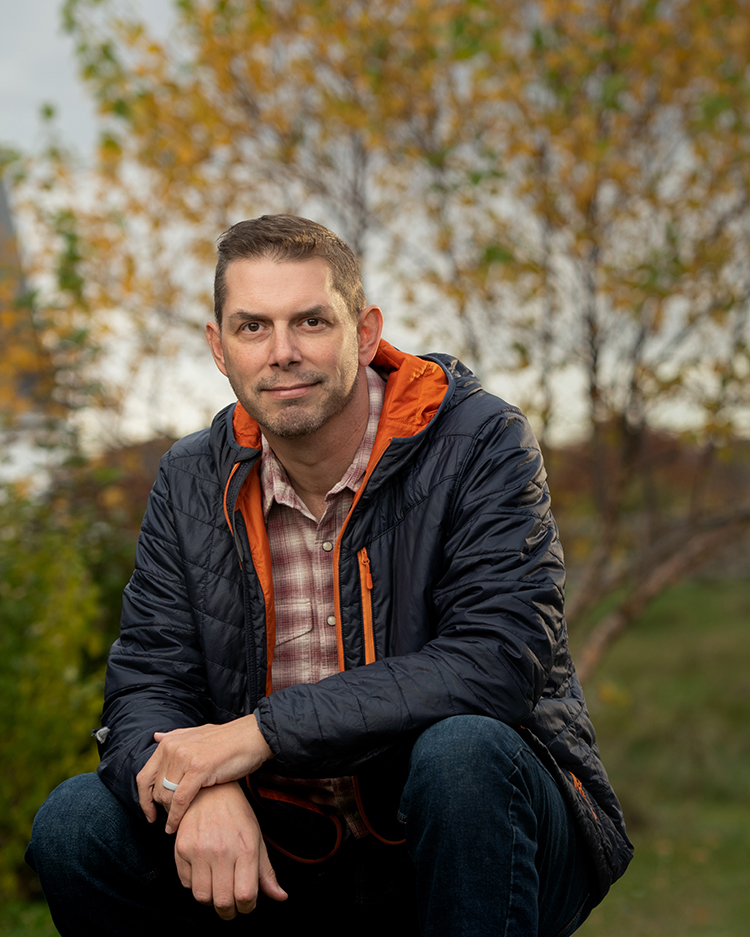
Trevor Maxwell set out to create a space where men with cancer could share their feelings. Photo by Brian Fitzgerald
While Maxwell was researching how men are isolated during cancer treatment, he also began reading about wolves. He came to see the animals, who travel in packs for support and protection, as a natural metaphor for how men could reconcile strength and vulnerability, masculinity and caring.
“If a wolf is sick or dying, that wolf is not going to get abandoned,” Maxwell says. “The others in the pack are going to go back and circle that wolf and take care of that wolf until that wolf comes back into the pack or passes away.”
Maxwell came to see that a big problem might have a simple solution: Men dealing with cancer needed a male-specific space, something like a pack, where they could feel comfortable sharing their feelings during a difficult journey.
Building a Pack
Like Trevor Maxwell, Joe Bullock of Durham, North Carolina, learned firsthand how hard it can be to carry on through cancer treatment alone. A typically happy-go-lucky person even when he was first diagnosed with stage III colon cancer in May 2018, three months of chemotherapy wore out Bullock more than he realized. His oncologist noticed the change.
“He said, ‘Right now, I’m seeing a really sad, broken person,’” Bullock recalls. “I never had anybody tell me that before.”
Bullock began seeing a therapist and attending cancer support groups at Duke Medical Center near his home in Durham, as well as participating in virtual treatment support groups such as Colontown, an online community of colorectal cancer patients and survivors. Like Maxwell, Bullock, who completed six months of chemotherapy, found that the support of others helped him through difficult times. After treatment, he too wanted to give back and help others.
In the last week of 2019, Bullock heard from Maxwell after the two had met on Colontown. Knowing Maxwell had been a journalist, Bullock assumed he was just asking for his story, but it was much more than that. Maxwell was thinking of starting a website and a podcast and establishing a social media presence.
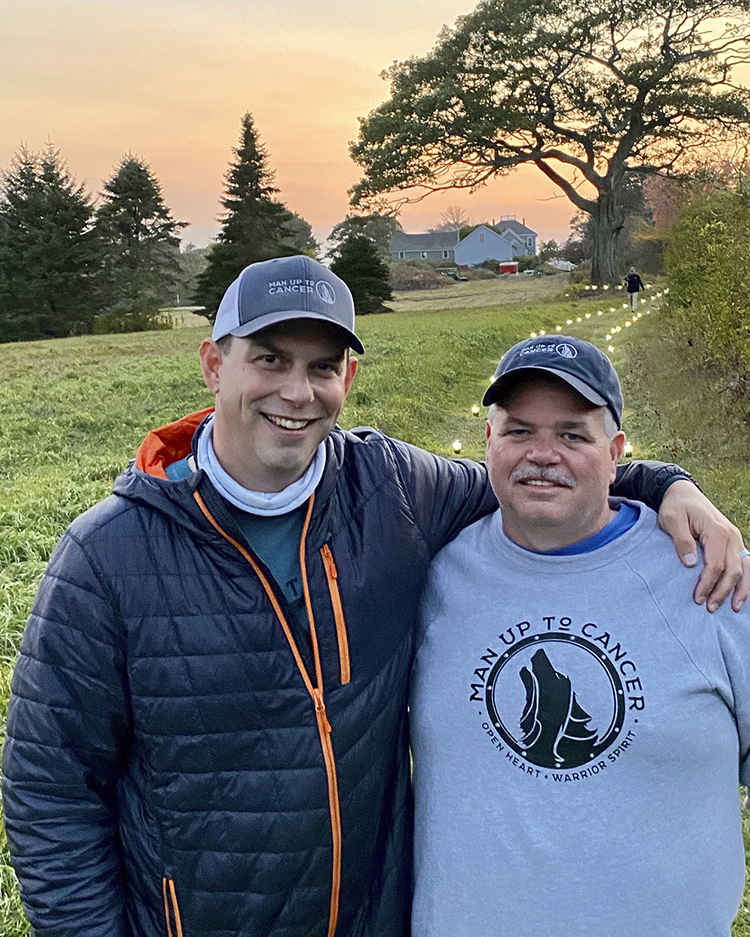
Trevor Maxwell and Joe Bullock worked together on the Howling Place, a Facebook group for men with cancer.
“One thing he wanted to do was to start this Facebook group called the Howling Place,” Bullock says. Maxwell asked Bullock to be an administrator of the male-only Facebook group. The Howling Place began on Jan. 1, 2020, as a private Facebook group, and Bullock immediately invited hundreds of men from the various groups he participated in. By Feb. 1, there were 300 members, and in October 2021, with Bullock serving as lead administrator of the group, membership had swelled to more than 1,200 men.
“I told him one time, ‘Through all this, you’re going to be blessed to create something bigger than yourself,’ and that’s exactly what’s happened,” Bullock says of his talks with Maxwell. “We have men in Australia, the U.K. and Canada. We have men as far away as China and Korea who are all a part of the Howling Place.”
The Man Up to Cancer website launched on Feb. 1, 2020, followed by the Man Up to Cancer podcast on July 9.
Part of the broad appeal of Man Up to Cancer and the Howling Place Facebook group is the focus on emotional and psychological support among men, rather than treatment of a particular cancer. There are many groups for discussing treatment options for colon cancer, such as Colontown, Bullock says, but few places exist where men can support each other as Maxwell envisioned, as a supportive pack.
“When we were younger, we were on our baseball teams and our football teams and other athletic teams. We looked for the support of that team,” Bullock says of the pack concept. “It really made sense.”
Giving and Getting Back
Man Up to Cancer may have gone international, but its influence is still felt close to home.
Patients often show up at Evans’ practice wearing hats or T-shirts imprinted with the Man Up to Cancer logo, which features a howling wolf. “I’ll have patients who will come in and mention Trevor to me, not even knowing that I take care of him,” says Evans.
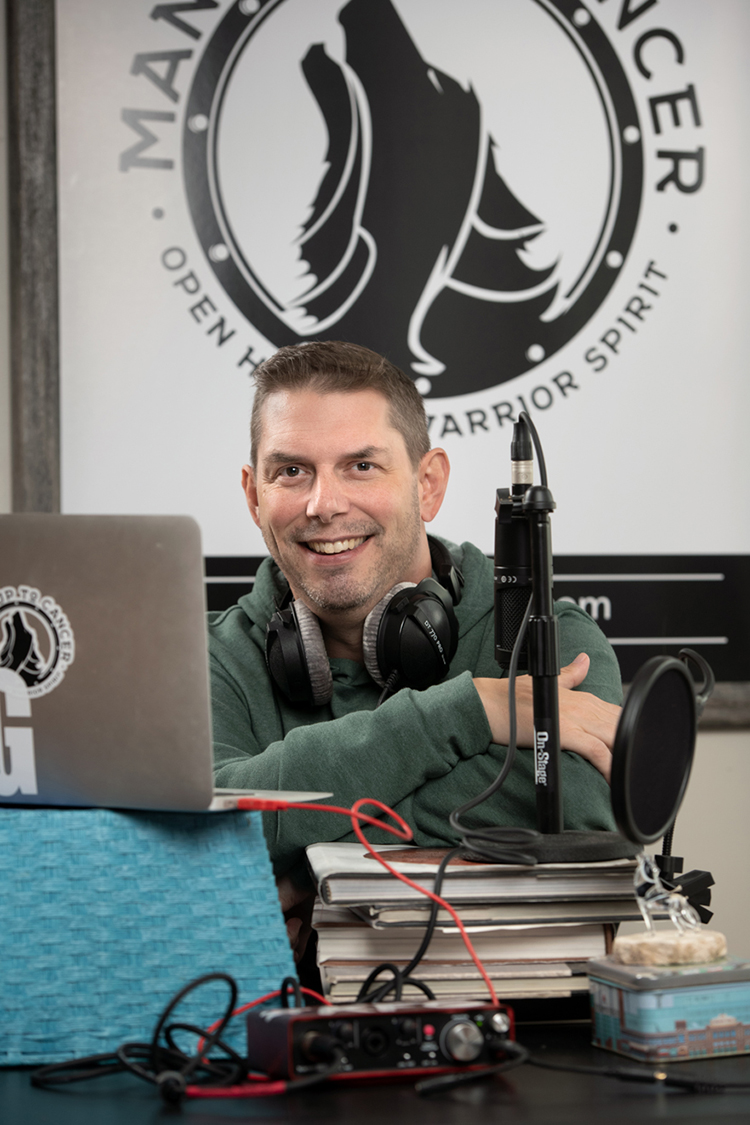
Trevor Maxwell launched the Man Up to Cancer podcast in July 2020. Photo by Brian Fitzgerald
While Evans says it’s hard to quantify the impact of groups like Man Up to Cancer, he and other clinicians often struggle to help patients with advanced disease discuss, balance and improve their quality of life during treatment. People who participate in Man Up to Cancer “are in a better place with their diagnosis, and much, much more able psychologically to come to terms with it than those who don’t,” Evans says. “That leads directly to better quality of life. Less anxiety.”
And that’s true for Maxwell too, who created for others the support he needed for himself. It’s the support of his family and hundreds of men “who legitimately care” that Maxwell leans on as he continues his cancer treatment.
After a year on immunotherapy, Maxwell’s cancer progressed in late 2020, growing in the spaces between his organs in his abdomen and butting against his stomach, spleen, liver and diaphragm. In February and March 2021, he traveled to Baltimore to participate in an immunotherapy clinical trial at the Johns Hopkins Kimmel Cancer Center, but his cancer did not respond. Over the summer, Evans and Maxwell decided Maxwell would start on a combination of chemotherapies—5-fluorouracil, leucovorin, oxaliplatin and irinotecan plus bevacizumab—in hopes that it could knock the cancer back enough for surgery to remove the remaining tumors in his body. Maxwell had surgery on Sept. 22 and completed two more rounds of chemotherapy. The weekend after Thanksgiving, he shared hopeful news.
“Big news—I’m done with chemotherapy!” he emailed to his many supporters. “Now it’s on to surveillance. Monthly blood draws and scans every three months, because we know that once a cancer is metastatic, chances are high that it will return. But not today.”
Cancer Today magazine is free to cancer patients, survivors and caregivers who live in the U.S. Subscribe here to receive four issues per year.

